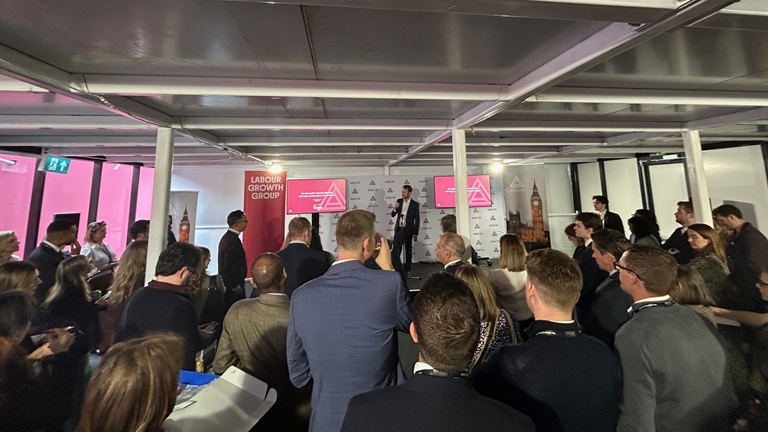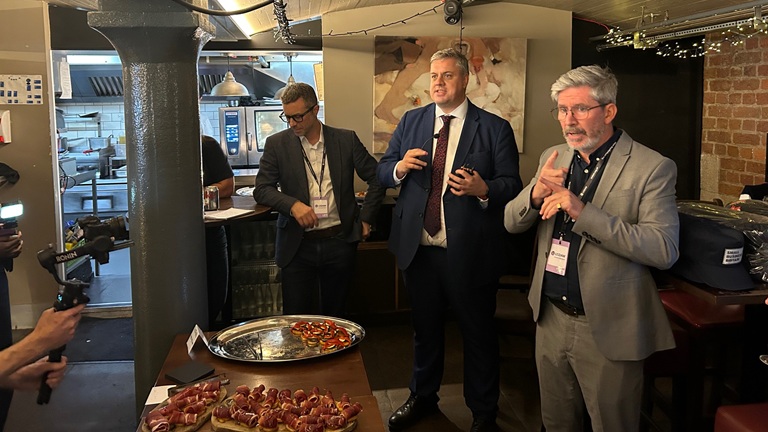Labour Party Conference: From fixing foundations to renewal
)
Posted: Tue 30th Sep 2025
11 min read
This year's Labour Party Conference machine had one message running through every hall, fringe and roundtable: "Renew Britain".
Labour's first year in office was about repairing the damage and "fixing the foundations". In its second year, ministers want to prove they can turn strategies into delivery.
The conference was crowded with business groups, non-governmental organisations (NGOs) and representatives from every major sector.
For small businesses, the key question was whether the government's promises on stability, skills and growth will turn into concrete support.
What it's like inside the secure zone
The conference site is vast, with buildings, pop-up hubs and packed rooms that make it easy to lose your bearings.
Think tanks, businesses and campaign groups all run back-to-back events, leaving little time to pause. Like the news organisation Politico's Pub.
What stands out is the proximity to power and influence, from the individuals deciding the country's future, to the media leaders shaping the debate.
Walking between fringe panels, it isn't unusual to find the Prime Minister or senior ministers brushing past. The access to decision-makers is constant and direct, giving business groups rare chances to raise concerns face to face.
Between panels and roundtables, corridors and cafés fill with hurried networking. Conversations over coffee spill into the next session, and the pace barely slows. The energy carries on late into the night, with some receptions running into the early hours.
The Chancellor's speech: stability, investment and reform
Chancellor Rachel Reeves set the tone with a clear message: stability and responsibility will underpin the government's economic approach.
She drew a sharp line under the turbulence of recent years, promising no repeat of "reckless" experiments – referring to the mini-budget of 2022.
Her priorities included the following:
A national wealth fund to invest in infrastructure and industry.
Reforms to pensions and planning to unlock long-term investment.
Trade and investment deals with India, the United States and European allies, alongside $150 billion of US investment already secured.
Regional balance, with a pledge to protect capital spending outside London and the South East.
Support for exporters and manufacturers by reducing barriers to trade.
Small businesses weren't mentioned directly, but many measures are indirectly relevant, such as:
keeping taxes, inflation and interest rates low
cutting red tape in planning
reducing trade barriers
For SMEs, the message was about a more predictable, supportive environment rather than new schemes.
Reeves also framed Labour's political identity: rejecting austerity, emphasising support for working people and promising a 'renewed economy that works for working people', with government taking an active role in national renewal rather than standing back.
All eyes on the Budget
In line with other media commentators, City AM editor in chief Christian May suggested the speech was overshadowed by the speech she hasn't made yet – the Budget next month.
Other commentators suggested Reeves was standing firm on her fiscal rules, but many saw it a prelude to tax rises on 26 November.
Chris Curtis MP: growth as the priority
Straight after the Chancellor's address, a reception hosted by global accounting software firm Sage and the Labour Growth Group featured a keynote from Chris Curtis, MP for Milton Keynes North.
He reinforced Reeves's central message: fiscal responsibility and stability are the foundation of growth. He argued:
"There is nothing progressive or left wing about running up large budget deficits and having to pay billions to service that debt each year."
Curtis made clear that growth is this government's number-one priority. Sound public finances, he said, are essential if Labour is to invest in services, support business and create opportunity.
His message echoed the Chancellor's: responsible choices, backing working people and a government prepared to take an active role in economic renewal.

A new Small Business Minister: practical and personal
Blair McDougall, the new Minister for Small Business and Economic Transformation, used his appearance at a reception hosted by BT and Small Business Britain to set out his priorities.
He called the role a "labour of love", drawing on his own experience of running a small firm. His remarks were strikingly personal, praising the creativity and energy of entrepreneurs and quoting poetry about people who "throw themselves into things".
He said small business support should be more than a political duty, and identified three priorities:
Expanding access to finance
Delivering the Small Business Plan
Tackling late payment
McDougall stressed that he doesn't want to be another minister making rhetorical promises. He framed the role as serious work, but also a rewarding chance to deliver practical changes that make it easier, cheaper and quicker to do business.

David Pinto-Duschinsky: Labour as pro-business and pro-worker
At a joint New Statesman and Santander reception, David Pinto-Duschinsky MP reinforced Labour's wider economic direction.
He argued that government shouldn't simply "get out of the way" but should actively support growth and development. His commitments included:
reducing barriers to trade
rebuilding relationships with European partners
investing in transport, energy and defence
expanding skills opportunities across the country
The political framing was deliberate. Labour wants to be both pro-business and pro-worker, aiming to seize the mantle of economic competence and distinguish itself from Conservative and Reform Party approaches.
For businesses, the implications are a steadier policy environment, increased infrastructure investment and stronger regional support.
Roundtable insights: innovation, skills and apprenticeships
A roundtable hosted by the Good Growth Foundation in partnership with Amazon brought together parliamentarians including Toby Perkins MP, Helena Dollimore MP and Callum Anderson MP.
Alongside business leaders and industry representatives, the group discussed how small firms can innovate and grow. The discussion highlighted several themes:
Platforms and support: Large platforms are helping small firms access markets, skills and training, but their reach remains limited compared with demand.
Apprenticeships: Apprenticeships matter for growth, but SMEs often find the system too complex and costly. The skills levy could work better if reformed with smaller firms in mind.
One business noted that they're often taking on an apprentice alongside the tasks of an already packed working day, which makes the burden harder to carry.
Barriers to growth: Profitability can take years to achieve, and founders described it as a "hard slog". Innovation is often sidelined because of the daily pressures of winning customers and paying bills.
Practical, hands-on guidance is valued more than theory, especially when it helps embed innovation into everyday functions such as marketing, accounts and customer engagement.
Large–small business links: Bigger firms can manage levy funds more easily and, where they transfer unused funds to SMEs, it makes a noticeable difference.
Regional challenges: Weak skills pipelines, underperforming schools, ageing workforces and poor infrastructure (from failing water systems to disruptive roadworks) continue to hold local firms back. Many also struggle to attract younger workers into skilled sectors.
Finance and procurement: Access to finance is still a hurdle, though improving. Smaller firms continue to underuse procurement opportunities, particularly in combined authority areas.
Retail and high streets: One in seven retail units is empty. Business rates were described as a drag, with suggestions such as targeted regeneration funds and temporary rates holidays for firms taking on vacant shops.
The discussion underlined that while national strategies are welcome, small firms want interventions that are practical, cut bureaucracy and deliver visible results locally.
Reflections: from strategy to delivery
Across speeches, receptions and roundtables, the conference showed a clear shift in tone.
Labour has launched a series of strategies in its first year – the Industrial Strategy, the Trade Strategy and the Small Business Plan – but businesses now want to know how the government will deliver them.
"Renew Britain" captured the government's attempt to move from repairing the past to proving it can deliver renewal.
The mood across the conference was focused on implementation: how policies on finance, apprenticeships, trade and infrastructure will translate into practical outcomes for businesses.
For small businesses, the signals are mixed but cautiously positive. The Chancellor's focus on stability, McDougall's personal commitment and the emphasis on reducing barriers to trade and investment all point in the right direction.
But as the roundtable showed, firms still face immediate hurdles, from late payment and finance to apprenticeships and local infrastructure.
The task for government now is simple but demanding: to turn strategies into changes that small firms can feel. In the year ahead, renewal will be judged not by speeches or slogans, but by delivery.
Read more of the latest business and policy news on Enterprise Nation
Get business support right to your inbox
Subscribe to our newsletter to receive business tips, learn about new funding programmes, join upcoming events, take e-learning courses, and more.
Start your business journey today
Take the first step to successfully starting and growing your business.
Join for free
